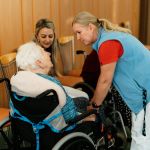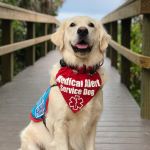It's a New Day in Public Health.
The Florida Department of Health works to protect, promote, and improve the health of all people in Florida through integrated state, county, and community efforts.
Special Needs Shelters
Special Needs Registry
Special needs shelters, managed by local county emergency management, provide essential care for individuals requiring support beyond what general shelters offer. Their capabilities vary based on community needs and available resources. For inquiries about registration, sheltering, transportation, or evacuation, contact your local Emergency Management Office.
Pre-registering for a Special Needs Shelter is a critical step in ensuring your safety during emergencies. By signing up in advance, you allow local emergency management to prepare the resources and support you may need. Click the link below and register today
Don’t wait, secure your spot and ensure you have access to the care and support you require when emergencies strike.
To ensure you have the information you need at your fingertips. The following sections provide quick access to key aspects of Special Needs Shelters.
Special Needs Shelters offer vital support during emergencies for individuals needing more than general shelter services, such as those relying on medical devices or requiring help with daily tasks. Pre-registration is highly recommended for eligible individuals to ensure access to this tailored assistance.
- Do I Qualify for a Special Needs Shelter?
- What Do I Bring to a Special Needs Shelter?
- What Can I Expect at a Special Needs Shelter?
- Where Can I Find a Special Needs Shelter?
- Can I Bring My Service Animals
Special needs shelters are for individuals who require assistance beyond what general shelters offer. This includes those who:
- Need help with daily tasks or use electronic medical devices.
- Have specific medical needs requiring more support than basic first aid.
- Have impairments or disabilities but are medically stable and don't need ongoing medical care.
- Have no other safe evacuation options.
It's important to note that not all individuals with disabilities need a special needs shelter; many can be accommodated in general population shelters. Eligibility and shelter capabilities can vary based on local community resources and needs. Pre-registration with your local Emergency Management Office is crucial to determine eligibility and ensure appropriate support.
Prepare an emergency shelter kit in a labeled duffle bag or backpack containing:
- Medications and Medical Equipment: Include all necessary medications with dosages, along with any medical equipment, batteries, and power cords.
- Personal Contacts and Medical Information: Bring a list of key contacts (friends, family, doctors with names and phone numbers) and a documented list of your medications.
- Clothing and Hygiene Items: Pack comfortable clothing and personal hygiene necessities.
- Important Documents: Include an emergency contact list, medical records, and other vital documents. Keep duplicates in a safe place and share copies with your support network and an out-of-area contact.
Basic food and water are provided, but special dietary needs may not be fully accommodated.
Special needs shelters aim to provide essential support for individuals with additional needs:
- Basic Provisions: Food and water will be available.
- Basic Medical Assistance: Staff can offer basic health monitoring and support but do not provide complex medical care or equipment.
- Sleeping Arrangements: Designated sleeping areas for clients and caregivers will be provided, typically in smaller spaces.
- Electricity: Backup power is available to support essential medical devices and lighting.
Activation of these shelters depends on the emergency and available resources.
Special needs shelters are managed by your local county Emergency Management Office. Contact them directly for information regarding specific shelter locations in your area and for details on registration, sheltering, transportation, and evacuation procedures. Visit FloridaDisaster.org for specific special needs shelter locations in your area.
While the original text doesn't explicitly detail service animal policies for special needs shelters, it's generally the case that trained service animals are permitted in emergency shelters, including special needs shelters. However, it's essential to confirm specific policies with your local Emergency Management Office beforehand regarding documentation, care requirements for your service animal, and any specific shelter guidelines.
Resources
- Pre-registration is highly recommended. It allows emergency management to prepare the necessary resources and support for you. Contact your local Emergency Management Office to register.
- Local emergency management agencies oversee the operation and closure of these shelters.
- The Florida Department of Health offers brochures and additional disaster planning guides for individuals with special medical needs in English, Spanish, and Creole.
- For more information and resources, visit your local Emergency Management Office or the Florida Department of Health Emergency Preparedness and Response website. You can also find information related to special needs shelters in Florida Statutes (Sections 252.355, 252.356, 381.0303) and Florida Administrative Code (Rule 64-3).
Brochures
In times of emergency, Florida's Special Needs Shelters stand as a vital resource, offering a supportive environment tailored to individuals with medical or functional needs that go beyond standard sheltering capabilities. By understanding your eligibility, preparing a comprehensive kit, and knowing what to expect, you can take proactive steps to ensure your safety and well-being.
Don't wait for a disaster to strike. We strongly encourage you to contact your local Emergency Management Office today to inquire about pre-registration, specific shelter locations, and any other questions you may have. Taking these steps now will provide peace of mind and ensure you have access to the care and support you need when it matters most. Stay prepared, stay safe.
Secure your spot and ensure you have access to the care and support you require when emergencies strike.
Disclaimer: The links and content provided on this page are for informational purposes and your convenience. The Florida Department of Health (DOH) does not endorse, approve, or guarantee the products, services, or opinions offered on external websites. Furthermore, the DOH is not responsible for the accuracy, content, or availability of these external sites. For questions or concerns, please contact the external site directly.









Connect with DOH